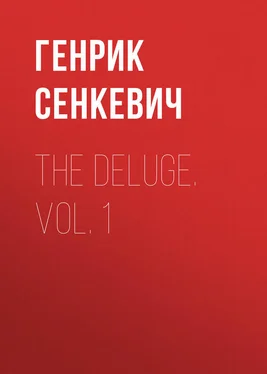Генрик Сенкевич - The Deluge. Vol. 1
Здесь есть возможность читать онлайн «Генрик Сенкевич - The Deluge. Vol. 1» — ознакомительный отрывок электронной книги совершенно бесплатно, а после прочтения отрывка купить полную версию. В некоторых случаях можно слушать аудио, скачать через торрент в формате fb2 и присутствует краткое содержание. Жанр: foreign_antique, foreign_prose, на английском языке. Описание произведения, (предисловие) а так же отзывы посетителей доступны на портале библиотеки ЛибКат.
- Название:The Deluge. Vol. 1
- Автор:
- Жанр:
- Год:неизвестен
- ISBN:нет данных
- Рейтинг книги:4 / 5. Голосов: 1
-
Избранное:Добавить в избранное
- Отзывы:
-
Ваша оценка:
- 80
- 1
- 2
- 3
- 4
- 5
The Deluge. Vol. 1: краткое содержание, описание и аннотация
Предлагаем к чтению аннотацию, описание, краткое содержание или предисловие (зависит от того, что написал сам автор книги «The Deluge. Vol. 1»). Если вы не нашли необходимую информацию о книге — напишите в комментариях, мы постараемся отыскать её.
The Deluge. Vol. 1 — читать онлайн ознакомительный отрывок
Ниже представлен текст книги, разбитый по страницам. Система сохранения места последней прочитанной страницы, позволяет с удобством читать онлайн бесплатно книгу «The Deluge. Vol. 1», без необходимости каждый раз заново искать на чём Вы остановились. Поставьте закладку, и сможете в любой момент перейти на страницу, на которой закончили чтение.
Интервал:
Закладка:
Besides the Billeviches there were only a few of the more considerable families in the neighborhood, such as the Sollohubs, the Montvills, the Schyllings, the Koryznis, the Sitsinskis, – though there was no lack of smaller nobility of these names; finally, the whole river region of Lauda was thickly studded with so-called "neighborhoods," or, in common parlance, zastsianki , 4 4 This word means technically "villages inhabited by petty nobles: " etymologically it means "behind walls," – hence, "beyond or outside the walls," as above.
occupied by the nobility of Lauda, renowned and celebrated in the history of Jmud.
In other neighborhoods of the region the families took their names from the places, or the places from the families, as was customary in Podlyasye; but along the river region of Lauda it was different. In Morezi dwelt the Stakyans, whom Batory in his time settled there for bravery at Pskoff; in Volmontovichi, on good land, swarmed the Butryms, the bulkiest fellows in all Lauda, noted for few words and heavy hands, – men who in time of provincial diets, raids on property, or wars were wont to go in close rank and in silence. The lands in Drojeykani and Mozgi were managed by the numerous Domasheviches, famed hunters; these men tramped through the wilderness of Zyelonka as far as Wilkomir on bear-trails. The Gashtovts occupied Patsuneli; their women were famous for beauty, so that finally all pretty girls around Krakin, Ponyevyej, and Upita were known as Patsuneli girls. The Sollohubs Mali were rich in horses and excellent cattle, bred in forest pastures. The Gostsyeviches in Goshchuni made tar in the woods, from which occupation they were called Gostsyevichi Charni (Black) or Dymni (Smoky), – the Black or Smoky Gostsyeviches.
There were other villages and families also. The names of many of them are still extant; but these villages are not situated as before, and men call them by other names. Wars came too with misfortunes and fires, villages were not always rebuilt on the ruins; in a word, much has changed. But in that time old Lauda was still flourishing in its primeval estate; and the nobles had reached their highest repute a few years before, when, fighting at Loyovo against the uprisen Cossacks, they covered themselves with great glory under the lead of Yanush Radzivill.
All the Lauda men served in the regiment of old Heraclius Billevich, – the richer with two horses, the poorer with one, and the poorest as attendants. In general, these nobles were warlike, and especially enamoured of a knightly career; but in questions which formed the ordinary subjects of discussion at a provincial diet they were less skilled. They knew that there was a king in Warsaw; that Radzivill and Pan Hlebovich were starostas in Jmud, and Pan Billevich at Vodokty in Lauda. That was sufficient for them; and they voted as Pan Billevich instructed them, convinced that he wanted the same as Pan Hlebovich, and that the latter went hand in hand with Radzivill. Radzivill was the king's arm in Lithuania and Jmud; the king was the consort of the Commonwealth, the father of the legion of nobles.
Pan Billevich was, in fact, a friend rather than a client of the powerful oligarchs in Birji, and a greatly esteemed one at that; for at every call he had a thousand voices and a thousand Lauda sabres, – and sabres in the hands of the Stakyans, the Butryms, the Domasheviches, or the Gashtovts were despised at that period by no man on earth. It was only later that everything changed, just at the time when Pan Heraclius Billevich was no more.
This father and benefactor of the nobles of Lauda died in 1654. In that year a terrible war 5 5 This war was carried on by the Tsar Alexis, father of Peter the Great and son of Michael Romanoff. Set Introduction.
flamed forth along the whole eastern line of the Commonwealth; Pan Billevich did not go to it, for his age and his deafness did not permit; but the Lauda men went. When tidings came that Radzivill was defeated at Shklov, and the Lauda regiment in an attack on the hired infantry of France was cut almost to pieces, the old colonel, stricken by apoplexy, yielded his soul.
These tidings were brought by a certain Pan Michael Volodyovski, a young but very famous warrior, who instead of Heraclius had led the Lauda regiment by appointment of Radzivill. The survivors came with him to their inherited fields, wearied, weighed down, and famished; in common with the whole army, they complained that the grand hetman, trusting in the terror of his name and the spell of victory, had rushed with small forces on a power ten times greater than his own, and thus had overwhelmed the army and the whole country.
But amid the universal complaining not one voice was raised against Volodyovski. On the contrary, those who had escaped lauded him to the skies, relating wonders of his skill and his deeds. And the only solace left the survivors was the memory of the exploits performed under the young colonel's leadership, – how in the attack they had burst through the first line of reserves as through smoke; how later they fell on the French mercenaries and cut to pieces with their sabres the foremost regiment, on which occasion Pan Volodyovski with his own hand killed the colonel; how at last, surrounded and under fire from four sides, they saved themselves from the chaos by desperate fighting, falling in masses, but breaking the enemy.
Those of the Lauda men who, not serving in the Lithuanian quota, were obliged to form a part of the general militia, listened in sorrow but with pride to these narratives. It was hoped on all sides that the general militia, the final defence of the country, would soon be called. It was agreed already that Volodyovski would be chosen captain of Lauda in that event; for though not of the local residents, there was no man among them more celebrated than he. The survivors said, besides, that he had rescued the hetman himself from death. Indeed, all Lauda almost bore him in its arms, and one neighborhood seized him from another. The Butryms, the Domasheviches, and the Gashtovts disputed as to whose guest he should be for the longest period. He pleased that valiant nobility so much that when the remnant of Radzivill's troops marched to Birji so as to be brought to some order after the defeat, he did not go with others, but passing from village to village took up his abode at last in Patsuneli with the Gashtovts, at the house of Pakosh Gashtovt, who had authority over all in that place.
In fact, Pan Volodyovski could not have gone to Birji in any event, for he was so ill as to be confined to the bed. First an acute fever came on him; then from the contusion which he had received at Tsybihovo he lost the use of his right arm. The three daughters of his host, who were noted for beauty, took him into their tender care, and vowed to bring back to his original health such a celebrated cavalier. The nobility to the last man were occupied with the funeral of their former chief, Heraclius Billevich.
After the funeral the will of the deceased was opened, from which it transpired that the old colonel had made his granddaughter, Aleksandra Billevich, daughter of the chief hunter of Upita, the heiress of all his property with the exception of the village of Lyubich. Guardianship over her till her marriage he confided to the entire nobility of Lauda-
"who, as they were well wishing to me," continued he in the will, "and returned kindness for kindness, let them do the same too for the orphan in these times of corruption and wickedness, when no one is safe from the license of men or free of fear; let them guard the orphan from mischance, through memory of me.
"They are also to see that she has safe use of her property with the exception of the village of Lyubich, which I give, present, and convey to the young banneret of Orsha, so that he may meet no obstacle in entering into possession of it. Should any man wonder at this my affection for Andrei Kmita, or see in it injustice to my own granddaughter Aleksandra, he must and should know that I held in friendship and true brotherly love from youthful years till the day of his death the father of Andrei Kmita. I was with him in war, he saved my life many times; and when the malice and envy of the Sitsinskis strove to wrest from me my fortune, he lent me his aid to defend it. Therefore I, Heraclius Billevich, under-chamberlain of Upita, and also an unworthy sinner standing now before the stern judgment of God, went four years ago, while alive and walking upon the earthly vale, to Pan Kmita, the father, the sword-bearer of Orsha, to vow gratitude and steady friendship. On that occasion we made mutual agreement, according to ancient noble and Christian custom, that our children-namely his son Andrei and my granddaughter Aleksandra-were to be married, so that from them posterity might rise to the praise of God and the good of the State, which I wish most earnestly; and by the will here written I bind my granddaughter to obedience unless the banneret of Orsha (which God forbid) stain his reputation with evil deeds and be despoiled of honor. Should he lose his inheritance near Orsha, which may easily happen, she is to take him as husband with blessing; and even should he lose Lyubich, to pay no heed to the loss.
Читать дальшеИнтервал:
Закладка:
Похожие книги на «The Deluge. Vol. 1»
Представляем Вашему вниманию похожие книги на «The Deluge. Vol. 1» списком для выбора. Мы отобрали схожую по названию и смыслу литературу в надежде предоставить читателям больше вариантов отыскать новые, интересные, ещё непрочитанные произведения.
Обсуждение, отзывы о книге «The Deluge. Vol. 1» и просто собственные мнения читателей. Оставьте ваши комментарии, напишите, что Вы думаете о произведении, его смысле или главных героях. Укажите что конкретно понравилось, а что нет, и почему Вы так считаете.











